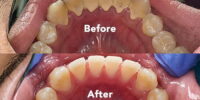Jaw Pain – 8 Top Causes And What You Should Do If Your Mouth Aches

Have you ever woken up in the morning with a sore, aching jaw? Jaw pain can be a symptom of many different things, ranging from mild to serious. It’s important to identify the cause of your pain in order to treat it accordingly.
In this article, we’ll explore 8 of the most common causes of jaw pain and what you can do to get relief. From teeth grinding to dental infections, we’ll cover it all so you can get back to feeling your best.
Let’s get started!
Teeth Grinding (Bruxism)
If you clench and grind your teeth, you’re likely experiencing bruxism, which can be a major source of discomfort in the jaw area.
This condition, which usually happens during sleep, can cause your teeth to become worn down, misaligned, and even cracked. In addition, the constant pressure and strain on your jaw muscles can lead to soreness, inflammation, and even headaches.
While bruxism can be caused by stress, anxiety, and sleep disorders, it is often because of an abnormal bite or missing teeth.
If you think you may have bruxism, the best thing to do is visit your dentist. They can check for signs of grinding or clenching and help you determine the underlying cause.
Your dentist may recommend a mouthguard to protect your teeth while you sleep, or suggest lifestyle changes that can help reduce your stress and anxiety. Additionally, you may need to see a doctor if your bruxism is caused by an underlying medical condition.
Temporomandibular Joint Dysfunction (TMJ)
Aching in the jaw area may be a sign of TMJ, a dysfunction of the temporomandibular joint. This is a disorder that affects the way the jaw functions, and can have a range of uncomfortable symptoms.
It is caused by a misalignment of the joint that connects the upper and lower jaw, which can be caused by an injury or grinding of the teeth. TMJ can lead to jaw pain, tenderness, a clicking noise when the mouth opens or closes, difficulty chewing, and headaches.
TMJ is usually treated with non-surgical methods such as physical therapy, lifestyle changes, and medications. In more severe cases, surgery may be necessary to realign the jaw.
It’s important to visit a doctor if you experience any of the symptoms of TMJ.
Arthritis
Arthritis is a common condition that can cause stiffness and swelling in the joints, making movement difficult and painful. This can also include the temporomandibular joint (TMJ) which connects the jaw to the skull and is responsible for many of the movements of the jaw.
When arthritis affects the TMJ, it can cause aching, pain, and tenderness in the jaw joint and surrounding muscles, resulting in jaw pain. The pain can be a dull ache or sharp, and can be worse when the jaw is used, such as when talking, eating, or yawning.
Treatment for TMJ arthritis usually includes anti-inflammatory medications, physical therapy, and stress reduction techniques to reduce the symptoms and pain. In some cases, surgery may be necessary to repair damage to the joint.
Dental Infections
Dental infections can cause discomfort and tenderness in your mouth, making it difficult to eat, talk, or even just move your jaw. Infections can occur in the teeth, gums, and other areas of the mouth, and they can be caused by bacteria or other organisms.
If you have a dental infection, you may experience redness, swelling, pain, bad breath, or a bad taste in your mouth. It’s important to get treatment for a dental infection so that it doesn’t spread or cause more serious problems.
Treatment may include antibiotics, root canals, or surgery. If you’re experiencing jaw pain from a dental infection, it’s best to visit a dentist or doctor to get an accurate diagnosis and treatment plan.
Jaw Injury
If your jaw’s in pain, it’s important to seek medical attention immediately to prevent further injury. Jaw injuries can range from minor to more serious, depending on the severity of the incident.
A common cause of jaw pain is physical trauma, like a punch, a fall, or an automobile accident. The pain can be localized to the area of the injury, or it may extend to other parts of the face or neck. In some cases, pain may be accompanied by swelling, redness, and the inability to move the jaw joint.
Treating a jaw injury depends on its severity. In some cases, a doctor may recommend anti-inflammatory medications to reduce swelling and pain. In more serious injuries, such as a fracture, wiring of the jaw may be necessary. Surgery may also be used to repair broken bones or correct misalignment of the jaw joint.
Treatment for a jaw injury can take several weeks or even months, depending on the severity of the injury. It’s important to follow the doctor’s instructions and rest the jaw to allow proper healing.
Stress and Anxiety
Anxiety and stress can take a toll on the body, often manifesting in physical discomfort. Jaw pain caused by stress and anxiety can be quite uncomfortable and cause further stress. This type of jaw pain can be caused by clenching the jaw muscles, grinding the teeth, and tension in the neck and facial muscles.
This type of pain can be worsened during times of increased stress or anxiety. It’s important to manage stress and anxiety in order to help reduce or alleviate jaw pain. Relaxation techniques such as deep breathing, yoga, and meditation can help to reduce stress and tension.
Other ways to manage stress include exercising, talking to a therapist, and getting enough rest. Eating a balanced diet can also help to reduce stress levels and improve overall physical and mental health.
Poor Posture
Poor posture can lead to tension in the neck and facial muscles, resulting in discomfort in the jaw area. Maintaining a good posture can help reduce the strain on your jaw.
Stand tall with your feet shoulder-width apart and your knees slightly bent. Make sure your shoulders are back and your head is centered over your spine. Keep your arms uncrossed and relaxed, and your chin tucked in slightly.
When sitting, keep your head and neck in line with the spine, and position your computer monitor at eye level. This will help to relieve tension in your jaw and neck muscles, and reduce the chances of jaw pain.
Tooth Extraction
Experience jaw discomfort? Tooth extraction may be an option to consider. If your tooth is severely decayed, causing pain, or if you have an impacted or wisdom tooth, tooth extraction is an option to consider. Tooth extraction is the process of removing a tooth from its socket. This procedure is done by a dentist or an oral surgeon. Depending on the complexity of the extraction, it can be done using local anesthesia, or intravenous sedation.
| Pros | Cons |
|---|---|
| Quickly resolves the issue | Painful |
| Prevents further decay | Complications may arise |
| Can be done with anesthesia | Bleeding |
| Can prevent other issues | Swelling |
| Affordable | Bruising |
Conclusion
It’s important to take your jaw pain seriously. If you experience any pain or discomfort in your mouth, see a doctor right away to get a proper diagnosis.
There are many causes of jaw pain, and it’s important to find out what’s causing yours. With the proper treatment, you can find relief from your jaw pain and get back to living life to the fullest.
Don’t wait to get checked out – if your jaw aches, take action now. You’ll be glad you did.









